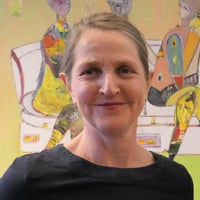EOP specialises in the following fields of work:
Within the scope of an evaluation, sustainable results and solutions can only be developed in cooperation with the key stakeholders. A sense of appreciation for participants and target groups as well as their various insights, perspectives and experiences are the guiding principle for the work of EOP.
This means that structured reflective discussions, feedback loops and workshops – with individual and mixed stakeholder groups – are important building blocks for promoting systematic and mutual learning on the part of the participants. This well-founded approach secures the developed solution so that it can be used in a sustainable manner for an organisation’s continued development.

I have worked as an independent evaluator, consultant and trainer since 2002 in the fields of education for sustainable development, Global Education, fair trade and development cooperation. I am a member of the German DeGEval – Evaluation Society, of the network “Evaluation entwicklungsbezogener Inlandsarbeit” (Evaluation of development education in Germany) and a member of the editorial board at the Zeitschrift für Entwicklungspädagogik (Journal of International Education Research and Development Education). I concluded my studies with an MA in Sinology, Economic Geography and German as a foreign language in Munich and Nanjing/People’s Republic of China. I subsequently obtained a Postgraduate Diploma in Development Studies at the University of Glasgow.
We assemble the ideal team for each assignment. EOP consists of a network of appraisers, experts and scientists from Germany, Austria and potentially also the respective country in which a development project is carried out. Project-related collaborations create access to comprehensive evaluation and consulting knowledge, diversified specialist knowledge and scientific expertise.
EOP has cooperated (amongst others) with the following partners and evaluators:
The evaluation is based on the declared evaluation goals as well as the information needs of the intended users.
The evaluation is planned and executed in a realistic, carefully thought-out, diplomatic and budget-conscious manner.
All of the people and groups concerned are treated in a respectful, fair manner during the evaluation.
The evaluation generates and imparts valid information and results on the subject of the evaluation and the questions posed.

The Opinion Monitor on Development Policy by DEval – the German Institute for Development Evaluation – once again examined the German population's attitudes towards development policy in 2024.
The results are thought-provoking, as support for development cooperation continues to decline across the entire political spectrum. The effectiveness of development cooperation is increasingly being critically evaluated. Overall, there is an overestimation of the percentage of GDP spent on development cooperation (2022: 0.85%). Although more than half of the respondents are interested in development policy and cooperation, 60% are unaware of the UN's Sustainable Development Goals (SDGs). Less than half of the respondents (43%) have been engaged in development policy over the past 12 months. Therefore, development policy communication, education for sustainable development, and global learning face significant challenges.
Brief Summary with many Infographics

What are the impacts of development education and Global Education? What stimulates these impacts? And how do we identify these impacts? These questions were examined in a research project commissioned by the BMZ (Federal Ministry for Economic Cooperation and Development) in collaboration with VENRO (the umbrella organisation of development and humanitarian aid NGOs in Germany). Thanks to the generous support of GENE, the Global Education Network Europe, on the basis of the support it receives from the European Commission and from various Ministries and Agencies in Europe, an English translation of the study, “Quality and Impact in Global Education - Empirical and Conceptual Perspectives for Planning and Evaluation” was published in April 2021 by the Waxmann Publishing House. You can access the book here (free download). If you wish to find out about lectures and workshops on the study results and their practical application, feel free to get in touch via email.

Get in contact at the earliest possible stage if you are planning an evaluation – no matter the scale. Experience has shown that the precise formulation of evaluation questions is challenging, as is the planning of evaluations. I will be happy to support you during this crucial preparatory phase – to which special attention should be paid in remote/ digital evaluations.
Some inspiration for your self-evaluation: You will find plenty of additional tips, materials, literature and links at www.selbstevaluation.de.
As a client and as someone interested in evaluation, you can find information and self-learning facilities on the topic of evaluation here.
The EOP clients come from the following areas:
EOP has stood for competence in evaluation, consultation and training since 2002. Many thanks to all our clients for the trust placed in EOP and the fruitful cooperation.
You can benefit from over 20 years of experience gained in nearly 50 evaluations and studies. See for yourself and get an idea of the range of services offered by EOP. The project examples provide further information on a selection of completed assignments.
I would be delighted to send you a complete list of references by email.
EPIZ Berlin: Formative Evaluation of the Project "Setting Sail for Climate Education – Consolidation of Learning Opportunities for Vocational Climate Education within the Network of Berlin's Beacon Schools for Vocational Training for Sustainable Development"
Information about the Project
Team: Eva Quiring, EQ EvaluationsGmbH & Susanne Höck/EOP
The Academy for International Cooperation (AIZ) of the German Gesellschaft für Internationale Zusammenarbeit (GIZ) has been preparing technical and leadership personnel for international cooperation deployments since 1965. The Skills4Abroad program offered by AIZ is used annually by over 1,600 participants from more than 35 organizations. The training is offered both in-person and digitally, can be combined with self-learning and consulting services, and is available to participants both before and up to 24 months after their departure. At the end of 2023, a new digital learning platform was launched, equipped with structured self-learning and networking opportunities. The study examined the effects of the learning process among participants approximately 12 months after their departure and supplemented the predominantly quantitative data from the M&E system with a qualitative perspective. These qualitative data have been collected at regular intervals since 2016.
Further Information about Skills4Abroad
Team: Eva Quiring, EQ EvaluationsGmbH & Susanne Höck/EOP
Since 2005, Weltfriedensdienst (WFD) has been conducting development policy-related educational, campaign, and advocacy work to raise awareness among various target groups. Since 2013, the focus has primarily been on sustainable water management. The State Central Agency for Development Cooperation (LEZ) in Berlin, the Development Policy Education Funding Program (FEB) by Engagement Global, and Bread for the World co-finance corresponding projects. The evaluation analyzed the initiatives implemented since 2017 in terms of relevance, quality, effectiveness, and impact, and provided recommendations for the further development of the three areas of work.
Further Information about the Project
Team: Eva Quiring, EQ EvaluationsGmbH & Susanne Höck/EOP
The focus was on the project "Capacity Building of Bread for the World's Partner Organizations". Corresponding qualifications and consulting services for partner organizations are provided through advisory and support services as well as multipliers worldwide, who primarily advise locally on financial management and impact orientation. The evaluation assessed the project's implementation to date and identified best practices and opportunities for efficiency improvements. The key questions of the evaluation concerned the project's effectiveness and impact, relevance, efficiency, and sustainability. The utilization-oriented and multi-perspective evaluation (stakeholder analysis, preparation for the use of evaluation results through reflection and validation workshops with all internal stakeholder groups, focus on "best practices") was also intended to provide guidance on the design of the next project phase starting mid-2024.
Terms of Reference for the Evaluation
Team: Dr. Maria Gutknecht-Gmeiner/IMPULSE (co-ordinator) & Susanne Höck/EOP;
for interviews: Madeleine Rodríguez Startz / Konzept-Beratung und Training & Marco Hanitzsch/ CoResult
The focus was on the "Berlin Development Policy Education Program" (benbi), which has been held annually in November since 2000. With a comprehensive one-week workshop program involving over 20 NGOs and independent educational consultants on varying development policy topics, students and teachers from all Berlin districts and all types of schools are addressed.
The objective of the evaluation was, among other things, to reflect on the impact potential of benbi and to examine the sustainability of the education program with a view to structurally anchoring global learning in schools.
Further Information about the benbi Education Program
Team: Prof. Dr. Claudia Bergmüller-Hauptmann, Eva Quiring, EQ EvaluationsGmbH & Susanne Höck/EOP
EOP
Susanne Höck
Telephone: +49 8161 45 999 76
Mobile: +49 162 91 480 12
Email: susanne.hoeck(at)eop-evaluation.de
P.O. Box 11 15
85311 Freising
Brief profile
EOP evaluates projects and programmes and supports you in the development of your organisation. A comprehensive project and programme service in addition to training offers for evaluation and project management round out EOP’s profile, all designed to ensure your long-term success.
EOP supports Entrepreneurs for future.